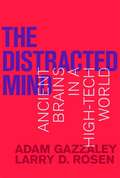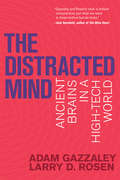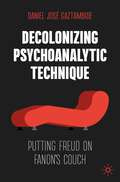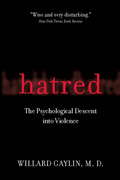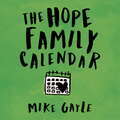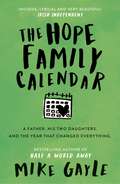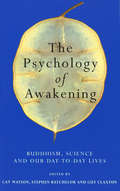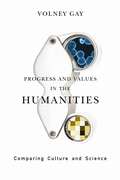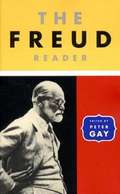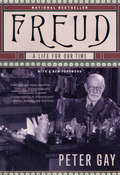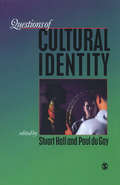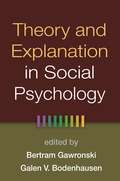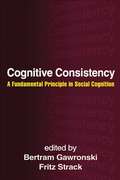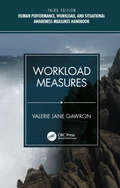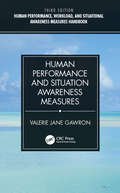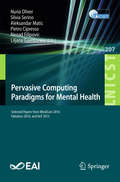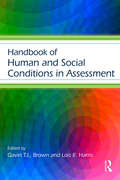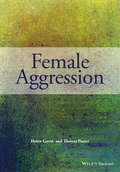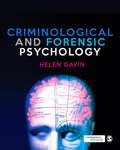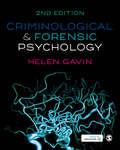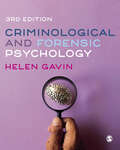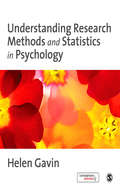- Table View
- List View
The Distracted Mind: Ancient Brains in a High-Tech World
by Adam Gazzaley Larry D. RosenMost of us will freely admit that we are obsessed with our devices. We pride ourselves on our ability to multitask -- read work email, reply to a text, check Facebook, watch a video clip. Talk on the phone, send a text, drive a car. Enjoy family dinner with a glowing smartphone next to our plates. We can do it all, 24/7! Never mind the errors in the email, the near-miss on the road, and the unheard conversation at the table. In The Distracted Mind, Adam Gazzaley and Larry Rosen -- a neuroscientist and a psychologist -- explain why our brains aren't built for multitasking, and suggest better ways to live in a high-tech world without giving up our modern technology. The authors explain that our brains are limited in their ability to pay attention. We don't really multitask but rather switch rapidly between tasks. Distractions and interruptions, often technology-related -- referred to by the authors as "interference" -- collide with our goal-setting abilities. We want to finish this paper/spreadsheet/sentence, but our phone signals an incoming message and we drop everything. Even without an alert, we decide that we "must" check in on social media immediately.Gazzaley and Rosen offer practical strategies, backed by science, to fight distraction. We can change our brains with meditation, video games, and physical exercise; we can change our behavior by planning our accessibility and recognizing our anxiety about being out of touch even briefly. They don't suggest that we give up our devices, but that we use them in a more balanced way.
The Distracted Mind: Ancient Brains in a High-Tech World
by Adam Gazzaley Larry D. RosenWhy our brains aren't built for media multitasking, and how we can learn to live with technology in a more balanced way."Brilliant and practical, just what we need in these techno-human times."—Jack Kornfield, author of The Wise HeartMost of us will freely admit that we are obsessed with our devices. We pride ourselves on our ability to multitask—read work email, reply to a text, check Facebook, watch a video clip. Talk on the phone, send a text, drive a car. Enjoy family dinner with a glowing smartphone next to our plates. We can do it all, 24/7! Never mind the errors in the email, the near-miss on the road, and the unheard conversation at the table. In The Distracted Mind, Adam Gazzaley and Larry Rosen—a neuroscientist and a psychologist—explain why our brains aren't built for multitasking, and suggest better ways to live in a high-tech world without giving up our modern technology.The authors explain that our brains are limited in their ability to pay attention. We don't really multitask but rather switch rapidly between tasks. Distractions and interruptions, often technology-related—referred to by the authors as “interference”—collide with our goal-setting abilities. We want to finish this paper/spreadsheet/sentence, but our phone signals an incoming message and we drop everything. Even without an alert, we decide that we “must” check in on social media immediately.Gazzaley and Rosen offer practical strategies, backed by science, to fight distraction. We can change our brains with meditation, video games, and physical exercise; we can change our behavior by planning our accessibility and recognizing our anxiety about being out of touch even briefly. They don't suggest that we give up our devices, but that we use them in a more balanced way.
Decolonizing Psychoanalytic Technique: Putting Freud on Fanon's Couch
by Daniel José GaztambideBoth new and seasoned psychotherapists wrestle with the relationship between psychological distress and inequality across race, class, gender, and sexuality. How does one address this organically in psychotherapy? What role does it play in therapeutic action? Who brings it up, the therapist or the patient? Daniel José Gaztambide addresses these questions by offering a rigorous decolonial approach that rethinks theory and technique from the ground up, providing an accessible, evidence-informed reintroduction to psychoanalytic practice. He re-examines foundational thinkers from three traditions—Freudian, relational-interpersonal, and Lacanian—through the lens of revolutionary psychiatrist Frantz Fanon, and offers a detailed analysis of Fanon’s psychoanalytic practice. Drawing on rich yet grounded discussions of theory and research, Gaztambide presents a clinical model that facilitates exploration of the social in the clinical space in a manner intimately related to the patient’s presenting problem. In doing so, this book demonstrates that clinicians no longer have to choose between attending to the personal, interpersonal, or sociopolitical. It is a guide to therapeutic action “on the couch,” which envisions political action “off the couch” and in the streets. Decolonizing Psychoanalytic Technique provides a comprehensive, practice-oriented and compelling guide for students, practitioners, and scholars of critical, multicultural and decolonial approaches to psychotherapy.
Hatred: The Psychological Descent Into Violence
by Willard GaylinWe all get angry at the built-in frustrations and humiliations of everyday life. But few of us ever experience the intense and perverse hatred that inspires acts of malignant violence such as suicide bombings or ethnic massacres. In Hatred, Dr. Willard Gaylin, one of America's most respected psychiatrists, describes how raw personal passions are transformed into acts of violence and cultures of hatred. Such hatred goes beyond mere emotion. Hatred, Gaylin explains, is a psychological disorder-a form of quasi-delusional thinking. It requires forming "a passionate attachment," an obsessive involvement with the scapegoat population. It is designed to allow the angry and frustrated individual to disavow responsibility for his own failures and misery by directing it towards a convenient victim. Gaylin dissects the mechanisms by which cynical political and religious leaders manipulate frustrated and deprived people, leading to the acts of mass terror that threaten us all. Step-by-step, he leads us into an understanding of the psychological pathway to acts of terrorism-an understanding that is an essential to survival in a world of hatred. Hatred is a masterwork in Willard Gaylin's life-long study of human emotions. Writing for the educated lay audience in the eloquent, accessible language of his bestsellers Feelings and Rediscovering Love, he takes us to the very roots of hatred.
The Hope Family Calendar
by Mike GayleTom Hope is broken. Ever since his wife Laura died he hasn't been the same man, and definitely not the same father. Luckily however, his mother-in-law Linda is there to pick up the pieces and look after his two struggling daughters, Evie and Lola. But Tom getting arrested on the first anniversary of his wife's death is the last straw for Linda.She decides on drastic action, and in a final attempt to make Tom reconnect with his daughters, Linda leaves for Australia. Now, with two fast-maturing girls on his hands, Tom has to learn how to accept his responsibilities and navigate the newly discovered world of single fatherhood - starting immediately. While Linda finds her journey brings more than she bargained for, Tom suddenly has only himself to rely on. Will he fall back into grief or finally step up and be the father his girls need?Bittersweet, funny and sad, THE HOPE FAMILY CALENDAR is a novel about grief, love and family.(P)2016 Hodder & Stoughton
The Hope Family Calendar
by Mike GayleA compelling and emotional novel, for fans of Jojo Moyes and Jenny Colgan.'With a style similar to David Nicholls, Gayle's writing is incisive, lyrical and very beautiful...It's impossible not to fall in love with the Hope family' Irish IndependentTom Hope is broken. Ever since his wife Laura died he hasn't been the same man, and definitely not the same father. Luckily for Tom his mother-in-law Linda is around to pick up the pieces and look after his two struggling daughters, Evie and Lola. But Tom getting arrested on the first anniversary of his wife's death is the last straw for Linda.In a last bid attempt to make Tom reconnect with his daughters she takes drastic action and leaves for Australia. With two fast-maturing daughters Tom has to learn how to accept his responsibilities and navigate the newly discovered world of single fatherhood - starting immediately. With only himself to rely on, will Tom fall back into grief or finally step up and be the father his girls need?Mike's new novel, The Man I Think I Know, is out now!
The Hope Family Calendar
by Mike GayleA compelling and emotional novel, for fans of Jojo Moyes and Jenny Colgan.'With a style similar to David Nicholls, Gayle's writing is incisive, lyrical and very beautiful...It's impossible not to fall in love with the Hope family' Irish IndependentTom Hope is broken. Ever since his wife Laura died he hasn't been the same man, and definitely not the same father. Luckily for Tom his mother-in-law Linda is around to pick up the pieces and look after his two struggling daughters, Evie and Lola. But Tom getting arrested on the first anniversary of his wife's death is the last straw for Linda.In a last bid attempt to make Tom reconnect with his daughters she takes drastic action and leaves for Australia. With two fast-maturing daughters Tom has to learn how to accept his responsibilities and navigate the newly discovered world of single fatherhood - starting immediately. With only himself to rely on, will Tom fall back into grief or finally step up and be the father his girls need?Mike's new novel, The Man I Think I Know, is out now!
The Psychology of Awakening: Buddhism, Science and Our Day-to-Day Lives
by Gay Watson, Stephen Batchelor and Guy ClaxtonThe Buddhist view of the mind - how it works, how it goes wrong, how to put it right - is increasingly being recognised as profound and highly practical by scientists, counsellors and other professionals. In The Psychology of Awakening, this powerful vision of human nature, and its implications for personal and social life, are for the first time brought to a wider audience by some of those most influential in exploring its potential for the way we live today. These include: David Brazier Jon Kabat Zinn Francisco Varela Joy Manne Geshe Thubten Jinpa Mark Epstein Gay Watson Maura Sills Guy Claxton Stephen Batchelor Deeply relevant, accessible and authoritative, The Psychology of Awakening will be of interest to all those who wish to understand the workings of their minds a little better and who are also seeking new ways of mastering the challenges - personal, professional and cultural with which modern life confronts us all.
Progress and Values in the Humanities: Comparing Culture and Science
by Volney GayMoney and support tend to flow in the direction of economics, science, and other academic departments that demonstrate measurable "progress." The humanities, on the other hand, offer more abstract and uncertain outcomes. A humanist's objects of study are more obscure in certain ways than pathogens and cells. Consequently, it seems as if the humanities never truly progress. Is this a fair assessment?By comparing objects of science, such as the brain, the galaxy, the amoeba, and the quark, with objects of humanistic inquiry, such as the poem, the photograph, the belief, and the philosophical concept, Volney Gay reestablishes a fundamental distinction between science and the humanities. He frees the latter from its pursuit of material-based progress and restores its disciplines to a place of privilege and respect. Using the metaphor of magnification, Gay shows that, while we can investigate natural objects to the limits of imaging capacity, magnifying cultural objects dissolves them into noise. In other words, cultural objects can be studied only within their contexts and through the prism of metaphor and narrative. Gathering examples from literature, art, film, philosophy, religion, science, and psychoanalysis, Gay builds a new justification for the humanities. By revealing the unseen and making abstract ideas tangible, the arts create meaningful wholes, which itself is a form of progress.
The Freud Reader
by Peter Gay Sigmund FreudWhat to read from the vast output of Sigmund Freud has long been a puzzle. Freudian thought permeates virtually every aspect of twentieth-century life; to understand Freud is to explore not only his scientific papers—on the psycho-sexual theory of human development, his theory of the mind, and the basic techniques of psychoanalysis—but also his vivid writings on art, literature, religion, politics, and culture. The fifty-one texts in this volume range from Freud's dreams, to essays on sexuality, and on to his late writings, including Civilization and Its Discontents. Peter Gay, a leading scholar of Freud and his work, has carefully chosen these selections to provide a full portrait of Freud's thought. His clear introductions to the selections help guide the reader's journey through each work. Many of the selections are reproduced in full. All have been selected from the Standard Edition, the only English translation for which Freud gave approval both to the editorial plan and to specific renderings of key words and phrases.
Freud: A Life For Our Time
by Peter GayNorton celebrates the 150th anniversary of Freud's birth by reissuing Peter Gay's best-selling biography, featuring a new introduction.
Questions of Cultural Identity: SAGE Publications
by Paul Du Gay Stuart HallWhy and how do contemporary questions of culture so readily become highly charged questions of identity? The question of cultural identity lies at the heart of current debates in cultural studies and social theory. At issue is whether those identities which defined the social and cultural world of modern societies for so long - distinctive identities of gender, sexuality, race, class and nationality - are in decline, giving rise to new forms of identification and fragmenting the modern individual as a unified subject. Questions of Cultural Identity offers a wide-ranging exploration of this issue. Stuart Hall firstly outlines the reasons why the question of identity is so compelling and yet so problematic. The cast of outstanding contributors then interrogate different dimensions of the crisis of identity; in so doing, they provide both theoretical and substantive insights into different approaches to understanding identity.
Theory and Explanation in Social Psychology
by Bertram Gawronski Galen V. BodenhausenThis volume provides the first authoritative explication of metatheoretical principles in the construction and evaluation of social-psychological theories. Leading international authorities review the conceptual foundations of the field's most influential approaches, scrutinizing the range and limits of theories in various areas of inquiry. The chapters describe basic principles of logical inference, illustrate common fallacies in theoretical interpretations of empirical findings, and outline the unique contributions of different levels of analysis. An in-depth look at the philosophical foundations of theorizing in social psychology, the book will be of interest to any scholar or student interested in scientific explanations of social behavior.
Cognitive Consistency
by Bertram GawronskiThis volume provides an overview of recent research on the nature, causes, and consequences of cognitive consistency. In 21 chapters, leading scholars address the pivotal role of consistency principles at various levels of social information processing, ranging from micro-level to macro-level processes. The book's scope encompasses mental representation, processing fluency and motivational fit, implicit social cognition, thinking and reasoning, decision making and choice, and interpersonal processes. Key findings, emerging themes, and current directions in the field are explored, and important questions for future research identified.
Workload Measures
by Valerie Jane GawronThis book was developed to help researchers and practitioners select measures to be used in the evaluation of human/machine systems. The book includes definitions of human workload and a review of measures. Each measure is described, along with its strengths and limitations, data requirements, threshold values, and sources of further information. To make this reference easier to use, extensive author and subject indices are provided. Features Offers readily accessible information on workload measures Presents general description of the measure Covers data collection, reduction, and analysis requirements Details the strengths and limitations or restrictions of each measure, including proprietary rights or restrictions Provides validity and reliability data as available
Human Performance and Situation Awareness Measures
by Valerie GawronThis book was developed to help researchers and practitioners select measures to be used in the evaluation of human/machine systems. The book begins with an overview of the steps involved in developing a test to measure human performance. This is followed by a definition of human performance and a review of human performance measures. Another section defines situational awareness with reviews of situational awareness measures. For both the performance and situational awareness sections, each measure is described, along with its strengths and limitations, data requirements, threshold values, and sources of further information. To make this reference easier to use, extensive author and subject indices are provided. <P><P>Features <li>Provides a short engineering tutorial on experimental design <li>Offers readily accessible information on human performance and situational awareness (SA) measures <li>Presents general description of the measure <li>Covers data collection, reduction, and analysis requirements <li>Details the strengths and limitations or restrictions of each measure, including proprietary rights or restrictions
Pervasive Computing Paradigms for Mental Health: 4th International Symposium, Mindcare 2014, Tokyo, Japan, May 8-9, 2014, Revised Selected Papers (Lecture Notes of the Institute for Computer Sciences, Social Informatics and Telecommunications Engineering #100)
by Liljana Gavrilovska Nenad Filipovic Pietro Cipresso Aleksandar Matic Silvia Serino Nuria OliverThis book constitutes the refereed proceedings of the 6th International Symposium on Pervasive Computing Paradigms for Mental Health, MindCare 2016, held in Barcelona, Spain, in November 2016, and the Second International Conference of Future Access Enablers of Ubiquitous and Intelligent Infrastructures, Fabulous 2016, Belgrade, Serbia, October 24-26, 2016, and the Third International Conference on Interoperability in IoT, IIoT 2015, Rome, Italy, October 26-27, 2015. The 24 papers were selected from 32 submissions. MindCare presents technologies in favor of maintaining and improving psychological well-being. Fabulous presents broad areas of future wireless networks, ambient and assisted living and smart infrastructures in order to interact, exchange ideas, expertise, experience and know-how. And finally IIoT presents tools and services in home automation and industrial service.
Handbook of Human and Social Conditions in Assessment (Educational Psychology Handbook)
by Gavin T. L. Brown and Lois R. HarrisThe Handbook of Human and Social Conditions in Assessment is the first book to explore assessment issues and opportunities occurring due to the real world of human, cultural, historical, and societal influences upon assessment practices, policies, and statistical modeling. With chapters written by experts in the field, this book engages with numerous forms of assessment: from classroom-level formative assessment practices to national accountability and international comparative testing practices all of which are significantly influenced by social and cultural conditions. A unique and timely contribution to the field of Educational Psychology, the Handbook of Human and Social Conditions in Assessment is written for researchers, educators, and policy makers interested in how social and human complexity affect assessment at all levels of learning. Organized into four sections, this volume examines assessment in relation to teachers, students, classroom conditions, and cultural factors. Each section is comprised of a series of chapters, followed by a discussant chapter that synthesizes key ideas and offers directions for future research. Taken together, the chapters in this volume demonstrate that teachers, test creators, and policy makers must account for the human and social conditions that shape assessment if they are to implement successful assessment practices which accomplish their intended outcomes.
Female Aggression
by Helen Gavin Theresa PorterThis critique explodes the stereotypical assumption that men are more prone than women to aggressionA cogent and holistic assessment of the theoretical positions and research concerning female aggressionExamines the treatment, punishment and community response to female aggressive behaviorExamines topics including sexual power, serial murder and the evolution of gendered aggressionTreats female aggression in its own right rather than as a counterpart to male violence
Criminological and Forensic Psychology
by Helen GavinCriminological and Forensic Psychology is a brand-new theoretically rigorous, practically relevant, engaging and fun introduction to this broad and fascinating field. It covers both the conceptual basis within which psychology knowledge is applied in forensic contexts and the practical applications of psychology to the criminal civil justice systems. Key Features: Case studies, which include the James Bulger investigation in Chapter 5, are woven into every chapter to bring the topic to life and encourage the application of knowledge by placing you in the full context of a criminal case, showing you how psychological theories can be used to explain real-life crimes. In-depth exploration of the fascinating courtroom process including separate chapters on The Defendant's Mind and The Jury. A dedicated chapter on research methods specific to forensic psychology to help you do your research project around this topic. A Companion Website available at www.sagepub.co.uk/gavinCFP is provided to support learning and includes chapter-by-chapter multiple choice questions to test understanding of the topic, additional case studies to reinforce learning, and links to further readings to continue your exploration of the subject.
Criminological and Forensic Psychology
by Helen GavinThe second edition of Criminological and Forensic Psychology is an even more theoretically rigorous, practically relevant, engaging and fun introduction to this broad and fascinating field. It covers both the conceptual basis within which psychology knowledge is applied in forensic contexts and the practical applications of psychology to the criminal civil justice systems. Key Features: Case studies feature in every chapter and place students in the full context of a criminal case, showing them how psychological theories can be used to explain real-life crimes. In-depth exploration of the fascinating courtroom process including separate chapters on the Defendant’s Mind and The Jury. A dedicated chapter on research methods specific to forensic psychology to help students do their research project around this topic, covering the final year and post-graduate research. A new chapter on Intimate relationship aggression: Domestic Violence and Domestic Homicide Online resources including chapter-by-chapter multiple choice questions, additional case studies and links to further readings
Criminological and Forensic Psychology
by Helen GavinThe second edition of Criminological and Forensic Psychology is an even more theoretically rigorous, practically relevant, engaging and fun introduction to this broad and fascinating field. It covers both the conceptual basis within which psychology knowledge is applied in forensic contexts and the practical applications of psychology to the criminal civil justice systems. Key Features: Case studies feature in every chapter and place students in the full context of a criminal case, showing them how psychological theories can be used to explain real-life crimes. In-depth exploration of the fascinating courtroom process including separate chapters on the Defendant’s Mind and The Jury. A dedicated chapter on research methods specific to forensic psychology to help students do their research project around this topic, covering the final year and post-graduate research. A new chapter on Intimate relationship aggression: Domestic Violence and Domestic Homicide Online resources including chapter-by-chapter multiple choice questions, additional case studies and links to further readings
Criminological and Forensic Psychology
by Helen GavinA truly modern approach to criminological and forensic psychology, this engaging text explores all aspects of the field, from defining forensic psychology, through the psychological explanations of crime and specific crime types, to the application of psychology in detection and investigation, the court room, and prison. This new edition has been fully updated to include more coverage of social and developmental factors impacting crime, female offenders, and crime in times of crisis, along with a brand-new chapter on stalking and harassment. The inclusion of topical issues such as white supremacy and the #MeToo movement places this book fully in the moment and explores issues that affect us all. With detailed case studies of real-life crimes throughout, this text is a perfect companion to your studies of forensic psychology at any level. Helen Gavin was, before retiring in 2023, Subject Lead in Criminal Psychology at the University of Huddersfield.
Criminological and Forensic Psychology
by Helen GavinA truly modern approach to criminological and forensic psychology, this engaging text explores all aspects of the field, from defining forensic psychology, through the psychological explanations of crime and specific crime types, to the application of psychology in detection and investigation, the court room, and prison. This new edition has been fully updated to include more coverage of social and developmental factors impacting crime, female offenders, and crime in times of crisis, along with a brand-new chapter on stalking and harassment. The inclusion of topical issues such as white supremacy and the #MeToo movement places this book fully in the moment and explores issues that affect us all. With detailed case studies of real-life crimes throughout, this text is a perfect companion to your studies of forensic psychology at any level. Helen Gavin was, before retiring in 2023, Subject Lead in Criminal Psychology at the University of Huddersfield.
Understanding Research Methods and Statistics in Psychology
by Helen GavinUnderstanding and applying research methods and statistics in psychology is one of the corner stones of study at undergraduate level. To enable all undergraduate psychology students to carry out their own investigations the textbook covers basic and advanced qualitative and quantitative methods and follows a sequential structure starting from first principles to more advanced techniques. Accompanied by a companion website, the textbook: - Grounds all techniques to psychological theory relating each topic under discussion to well established pieces of research - Can be used by the student at beginning and more advanced undergraduate level - therefore a `one-stop' shop - Includes a creative and practical selection of heuristic devices that cement knowledge of the techniques and skills covered in the textbook
